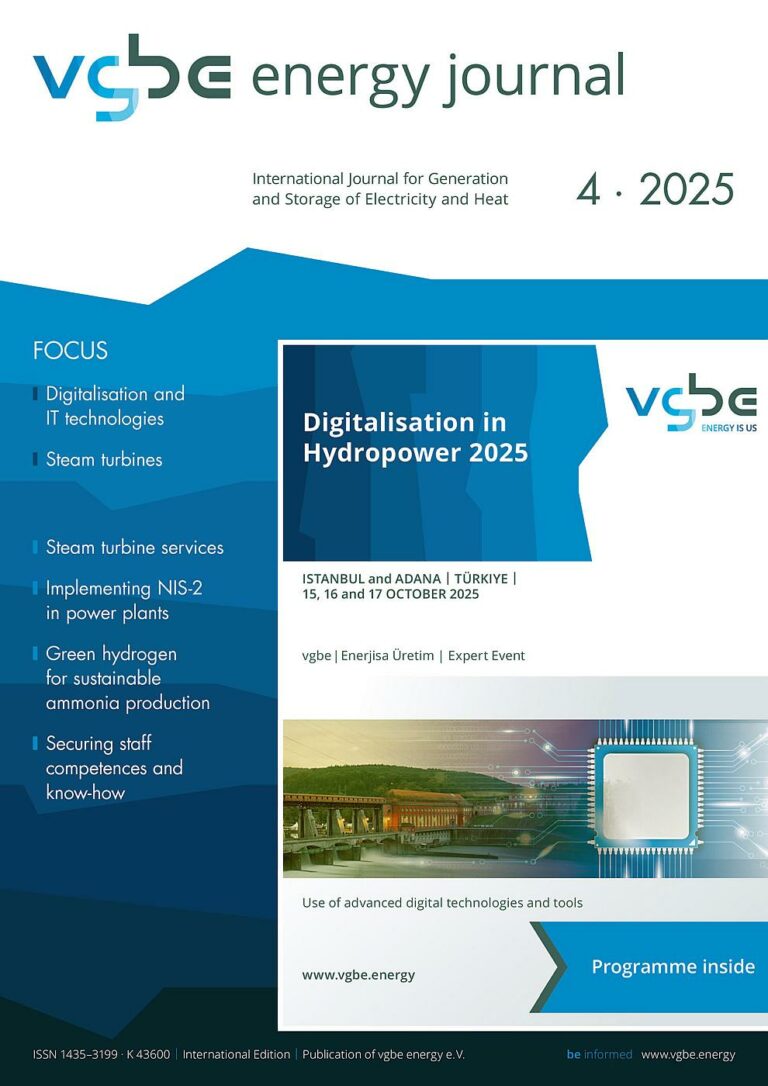What the energy sector needs now: skilled workers and political vision
Dr-Ing Christian Ullrich
Tomorrow’s energy supply starts with the decisions we make today – and the people who make them. But the energy sector is also facing a skills shortage. Companies are stretched to their limits when it comes to planning, building and operating power plants. There is a shortage of qualified junior staff, but also of experienced personnel in key positions, such as in control rooms or in the maintenance of complex technical systems. As a result, new projects may be delayed and existing plants may need technical optimisation. We must therefore act now to make our industry attractive to skilled workers and develop forward-looking training and experience-sharing programmes.
There are already reasons for cautious optimism. There is a welcome trend in education and training: training opportunities for power plant operators and engineers are once again attracting greater interest. Many courses are well subscribed or even fully booked. This shows that young people are once again interested in energy technology and want to work in our industry.
Turbine rotor serration grinding and whip peening as removal and preventative technique to stress corrosion cracking (SCC)
D.G. Hattingh, D. Bernard, M. Newby, A. Opperman, I.N. Wedderburn, D.J. Erasmus, R. Scheepers and C. Seitz
Stress Corrosion Cracking (SCC) is a common occurrence in older steam turbine rotor blade attachments. Early detection and timely removal of SCC are essential for extended safe life operation. Typically, the last stage blades on the low-pressure (LP) rotor side pose the greatest risk of failure due to size and dynamic loading. This paper presents a solution focused on the removal of surface-exposed SCC through guided grinding in the high-stress rotor shaft steeple serrations. This integrated approach resets fatigue life by eliminating cracks, optimizing geometry, and reducing peak stresses.
GrAmLi project – Green hydrogen for sustainable ammonia production
Nele David, Bernd Loder, Bernhard Pribyl-Kranewitter and Michael Unfried
Steam turbines service and solutions to reduce unavailability, improve flexibility and extend unit life
Gabriele Porta, Luca Corso and Marco Cioffi
In recent years the radical change in market demand introduced new challenges to steam turbines maintenance activities. The last experiences gained during inspections, with the operating statistics of individual components, have allowed to take steps forward in developments both in terms of components design and calculation of Equivalent Operating Hours (e.g., taking into account the contribution due to thermo-mechanical fatigue). The objective is to keep the aging of individual components under control, plan the preventive necessary actions to be done and meet new operational needs.
Is TOC measurement after deionisation really that problematic?
Dieter Mauer
Securing staff competences and know-how in the scope of maintaining the technical conditions of coal-fired units in the period prior to their replacement by RES
Ewa Trzeszczyńska, Jerzy Trzeszczyński and Radosław Stanek
In the foreseeable future, energy security in many European countries cannot be ensured without continuing to operate coal-fired power plants. This also applies to Poland, where lignite and hard coal account for approx. 60% of electricity generation. Competence in maintaining the technical condition will be crucial. An important part of maintenance is diagnostics as a source of knowledge about the current technical condition. Modern analytical, digital and IT technologies significantly improve its capabilities. Skillfully applied algorithms can replace specialists, the lack of which is becoming increasingly visible. A tailored organization of maintenance, including diagnostic services, can significantly reduce the risks associated with the longer and more flexible operation of coal-fired power plants and entire power plants.
The ransomware business model
A tongue-in-cheek treatise from the perspective of a management consultant
Laurentius Lockerbit
Implementing NIS-2 in the power plant – A concise guide for those responsible
Kent Andersson
Carbon pricing to support CCUS deployment
Gregory Cook and Paul Zakkour
Carbon capture, utilisation and storage (CCUS) covers a range of technologies including reducing carbon dioxide (CO2) emissions from large industrial sources, removing existing CO2 from the atmosphere and/or its ‘utilisation’ in various products and processes. Although CCUS has been widely considered as a key climate change mitigation technology for at least 20 years, it has yet to achieve the anticipated scale-up and investment flows needed. Alongside other forms of support, carbon pricing can play a crucial role in leveraging private finance into CCUS deployment.
Challenges for the EU gas storage in 2025
GEFC Gas Exporting Countries Forum
Report: vgbe conference “Maintenance in Power Plants 2025”
vgbe energy
The vgbe conference “Maintenance in Power Plants 2025”’ once again provided a valuable platform for exchanging information on current developments, challenges and best practices in power plant maintenance. Around 210 participants and 40 exhibitors from Germany and abroad were welcomed to Magdeburg on 5 and 6 March.
Editorial

Dr-Ing Christian Ullrich
Executive Managing Director
vgbe energy service GmbH
What the energy sector needs now: skilled workers and political vision
Dear readers of the vgbe energy journal,
Tomorrow’s energy supply starts with the decisions we make today – and the people who make them. But the energy sector is also facing a skills shortage. Companies are stretched to their limits when it comes to planning, building and operating power plants. There is a shortage of qualified junior staff, but also of experienced personnel in key positions, such as in control rooms or in the maintenance of complex technical systems. As a result, new projects may be delayed and existing plants may need technical optimisation. We must therefore act now to make our industry attractive to skilled workers and develop forward-looking training and experience-sharing programmes.
There are already reasons for cautious optimism. There is a welcome trend in education and training: training opportunities for power plant operators and engineers are once again attracting greater interest. Many courses are well subscribed or even fully booked. This shows that young people are once again interested in energy technology and want to work in our industry.
There is also constructive movement on the political level. The coalition agreement between the CDU/CSU and the SPD contains energy policy objectives that are of great importance to our industry. In addition to the expansion of renewable energies, the agreement also recognises the need to secure long-term, affordable generation capacity in the German electricity system. There are plans for the rapid construction of new hydrogen-compatible gas-fired power plants, which will not only serve as a bridging technology but will also play a central role in the future energy mix. The coalition partners are committed to technological openness, market-based incentives and close cooperation with European partners. This is an ambitious path that aims to reconcile security of supply, climate goals and affordability.
But ambitious policies alone are not enough. Many questions arise, especially when it comes to building secure generation capacity: Who will actually plan, supply, build and operate these new power plants? Where will the resources come from to plan, build, operate and maintain them? And, last but not least, where will the fuel for the many new gas-fired power plants come from?
Given the current market situation, it will mainly be international consortia that build these power plants. Against this background, quality assurance will be a key factor in the successful completion of these projects.
The global sourcing of components and systems means that a wide variety of technical standards, regulatory requirements and language barriers have to be overcome. As complexity increases, so does the risk of interface problems, delays and quality deviations. This makes it all the more important to establish binding technical rules, transparent processes and independent testing mechanisms.
In this demanding environment, vgbe plays a particularly important role with its comprehensive portfolio of services. As a technical competence centre and platform for the exchange of experience, the association offers its members and customers orientation, security and technical support. Whether through individual technical services in almost all areas of energy technology, training and further education, networking formats of all kinds or technical standardisation and benchmarking – vgbe is there when technical expertise, quality and reliable processes are required.
The future of energy will not be shaped by individual actors, but by their interaction. Politics, business, science and society must work together to master the great challenges of our time. The vgbe sees itself as a bridge builder – between technical knowledge and application, between experience and innovation, between today and tomorrow.
The German energy sector is at a crucial turning point. The next few years will decide whether the energy turnaround will really be a success. It is high time to set the course for a secure, sustainable and affordable energy supply. This requires courage, reliability and, above all, people who combine expertise with commitment. We at vgbe are ready to actively support this major task with our expertise and decades of experience in building and operating energy facilities. Together, we can meet the challenges of the energy revolution with knowledge, commitment and vision.
